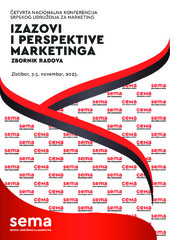Please use this identifier to cite or link to this item:
https://rfos.fon.bg.ac.rs/handle/123456789/2636| Title: | DELJENJE MOBILNOSTI U EVROPI: PRISTUP ZASNOVAN NA KLASTER ANALIZI SHARED MOBILITY IN EUROPE: A CLUSTER ANALYSIS APPROACH |
Authors: | Jovanović, Marta Ignjatović, Marina Jeremić, Veljko |
Contributors: | Hanić, Hasan Veljković, Saša |
Keywords: | ekonomija deljenja;deljenje mobilnosti;zemlje Evrope;sharing economy;shared mobility;European countries | Issue Date: | 2023 | Publisher: | Srpsko udruženje za marketing - SeMA | Abstract: | Kako se ekonomija deljenja brzo razvija, sveobuhvatan pregled situacije na evropskom prostoru u oblasti deljenja mobilnosti postaje sve potrebniji. Ovaj rad analizira stanje u oblasti deljenja mobilnosti u zemljama Evrope i sagledava način na koji se evropske zemlje mogu segmentirati u zavisnosti od stepena učešća u deljenju mobilnosti. Posmatrano je 12 indikatora deljenja transporta, u 26 zemalja Evropske Unije, za koje su podaci bili dostupni. Korišćena je klaster analiza i algoritam k-srednjih vrednosti (k‐means). Rezultati pokazuju da je najveći procenat korisnika deljenja transporta u grupi obrazovanih i mladih ljudi, uzrasta između 16 i 35 godina. Pored toga, korišćenjem klaster analize dobijena su tri segmenta zemalja Evrope. Analiza klastera otkriva jasne razlike u upotrebi veb-sajtova i aplikacija za deljenje automobila, kao i u obrazovanju i prihodima među različitim segmentima. Takođe, rezultati ukazuju da geografski položaj zemalja ne utiče na raspodelu zemalja unutar klastera, jer drugi i treći klaster čine zemlje iz različitih delova Evrope. Dobijeni rezultati mogu biti od koristi za donošenje odluka i usmeravanje marketinških i transportnih resursa ka određenim ciljnim tržištima, kao i za potrebe formiranja strategija nastupanja na određenim tržištima. As the sharing economy develops rapidly, a comprehensive overview of the situation on the European shared mobility scene is becoming increasingly necessary. This paper analyzes the state of shared mobility in European countries and observes how European countries can be segmented based on the populations’ participation in the economy of shared mobility. We observed 12 indicators of shared mobility in 26 countries of the European Union, for which the data were available. We used the K-means algorithm of cluster analysis. The results show that the highest percentage of shared mobility users belongs to the group of educated and young people aged between 16 and 35. In addition, three segments of European countries were obtained using cluster analysis. Cluster analysis reveals apparent differences in the use of shared mobility websites and applications, as well as differences in education income among segments. Additionally, the results indicate that the geographical position of the country does not affect the placement within the cluster, as the second and the third cluster contain countries from different parts of Europe. The results of our analyses can be helpful in decision-making and allocating marketing and transportation resources to specific target markets, as well as for development of market-entry strategies in specific markets. |
URI: | https://rfos.fon.bg.ac.rs/handle/123456789/2636 | ISBN: | 978-86-903768-2-7 |
| Appears in Collections: | Radovi istraživača / Researchers’ publications |
Files in This Item:
| File | Description | Size | Format | |
|---|---|---|---|---|
| bitstream_3887.pdf | SHARED MOBILITY IN EUROPE: A CLUSTER ANALYSIS APPROACH | 5.63 MB | Adobe PDF |  View/Open |
Page view(s)
6
checked on Dec 28, 2025
Download(s)
6
checked on Dec 28, 2025
Google ScholarTM
Check
Altmetric
This item is licensed under a Creative Commons License

